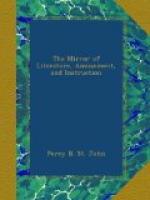* * * * *
THE GATHERER.
Ancient Trade.—Alexandria was formerly the chief commercial city in the world. We may judge of its wealth and prosperity by the circumstance, that, after the defeat of Queen Zenobia, a single merchant of this city, undertook to raise and pay an army out of the profits of his trade. Delos was the richest city in the Archipelago, it was a free port, where nations warring with each other, resorted with their goods, and traded. Strabo calls it one of the most frequented emporiums in the world; and Pliny tells us, that all the commodities of Europe and Asia were sold, purchased, or exchanged there. Trade was much encouraged at Athens; and if any one ridiculed it, he was liable to an action of slander. A fine of a thousand drachmas (about L37. 10s.) was inflicted on him who accused a merchant of any crime which he was unable to prove. Solon was engaged in merchandize; the founder of the city of Messilia was a merchant; Thales and Hippocrates, the mathematician, traded; Plato sold oil in Egypt; Maximinus the Roman emperor, traded with the Goths in the produce of his estate in Thracia; Vespasian farmed the privies at Rome; and the Emperor Pertinax, originally dealt in charcoal.
P.T.W.
Unnecessary fears about the Cholera.—Nothing is more calculated to allay unnecessay and groundless fear, in the case of the cholera, than the undeniable fact of the smallness of the mortality in proportion to the whole population, where it has raged with most violence. In addition to which, if it be borne in mind, that the disease invariably attacks those who are most predisposed to engender any malady, it is not unreasonable to infer, that of those to whom it has proved mortal, many would have died within the same period, had cholera not attacked them.—Morning Herald.




